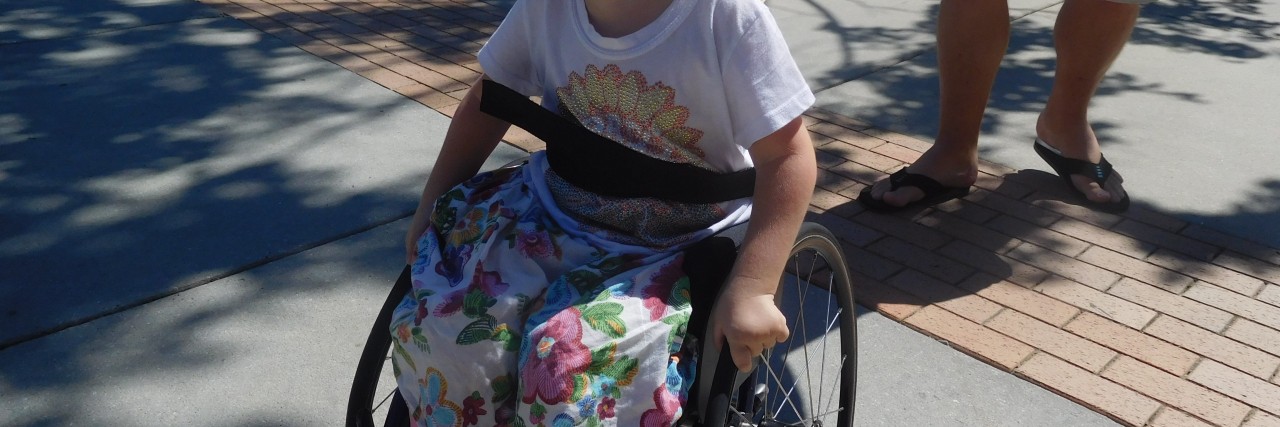What I Miss When I Leave My Medically Fragile Daughter to Work Outside the Home
The baby I was told I would no longer have by this time turned 3 the last Sunday of June. It was a sunny miracle of a day, this day we didn’t believe we would be blessed to enjoy. Heidi was diagnosed with spinal muscular atrophy type 1 when she was 3 months old. We were told she would be unable to breathe on her own within about a year. Her life expectancy was up to 2 years old. But Heidi has been able to benefit from a clinical trial drug. She breathes without ventilation and has more movement and strength than any of us would have believed possible. On her birthday, Heidi went to the mall, saw Finding Dory, shopped for toys and enjoyed her therapy pool.
When Heidi was diagnosed in October of 2013, I abandoned practicing law, in part to care for Heidi’s medical needs and in part because I wasn’t mentally competent to practice. I’ve spent the last nearly three years at home with Heidi, caring for her, arranging her appointments, and writing a book about our family’s experience with her. I finished my book Juncture at the Still Point in the spring and I’m sure that writing helped me keep my sanity during the couple of years after Heidi’s diagnosis.
Instead of the predicted deterioration and death, however, Heidi has exhibited slow but remarkable improvement. Recently my husband was laid off from his job and I ventured back into the work world. Not the high pressure, fractious world of litigation, as I had been a part of before, just low-paying litigation support projects. It’s low-stress, but also low-paying. It won’t pay all the bills, but if I have to suddenly leave work for an emergency, I don’t have clients who could go to jail or lose custody of a child as a result.
Leaving Heidi at home, even with a nurse and her father, is harder than I could have imagined, and for different reasons than I would have thought. Heidi’s medical condition is precarious and subject to sudden emergency, but Heidi’s nurse knows her needs well and her father certainly does. What makes leaving Heidi to work outside the home so hard is simply missing her and missing out on everything that goes into her care. I’m not able to make the calls and emails necessary for lining up her medical and nursing care and therapies. I’m not around to get updates from her therapists. It’s only been a few weeks since I began working on these projects. I don’t take Heidi to her doctor’s appointments or speech therapy. I wasn’t able to go to her Individual Education Plan meeting. Every morning I walk out the door feels like a day of something lost.
Though I gave up my previous career in law due to Heidi’s condition, I don’t miss that career. Instead, I now miss every moment that I might spend with Heidi, knowing her life can be unexpectedly taken at any time by a common cold that goes to pneumonia. As Heidi’s condition more often presents as physical disability than imminent death, however, my goal is to work toward as secure and consistent a life as possible. Our family must evolve as our “new normal” with Heidi continues to shift in directions we can’t predict. If financial hardship sometimes brings knowledge of what is important to people, the disability or chronic illness of a loved one does so much more essentially.
Most of us have some sense as we walk out the door to go to work that we are doing so for our families. We want our children to have stable lives that include food, shelter, medical care and a bit of recreation. Sometimes, though, parents get lost in the demands of work and alienated from the reasons for our efforts. Heidi changed this for me. A child with a life-threatening condition keeps a mother ever-conscious of what’s important. Heidi keeps me aware of what my efforts and commitments should be for: happy and engaged time with our loved ones, an awareness I deeply wish I’d had with my older, healthy children.
On Monday, before I leave the house to go to my project job, I take a couple of minutes to recall Heidi’s birthday. I summon Heidi’s smile as she watched Dory dart around the big-screen aquarium of neon fish in search of her parents. I recall the wonder in Heidi’s eyes as she worked to propel her little wheelchair around the outdoor space at the mall, a wide-open space new to her. She had later struggled to move her wheelchair with one hand and hold onto her new toy drum set with the other.
These are the moments we live and work for. As I miss Heidi today while I’m at work, I’ll remember yesterday and look forward to what the weekend will bring.
The Mighty is asking the following: Describe a moment at work that was either incredibly challenging or where you faced adversity. Tell us how you handled it or wish you had handled it. If you are unable to work, tell us one thing you wish others understood about your situation. Check out our Submit a Story page for more about our submission guidelines.

